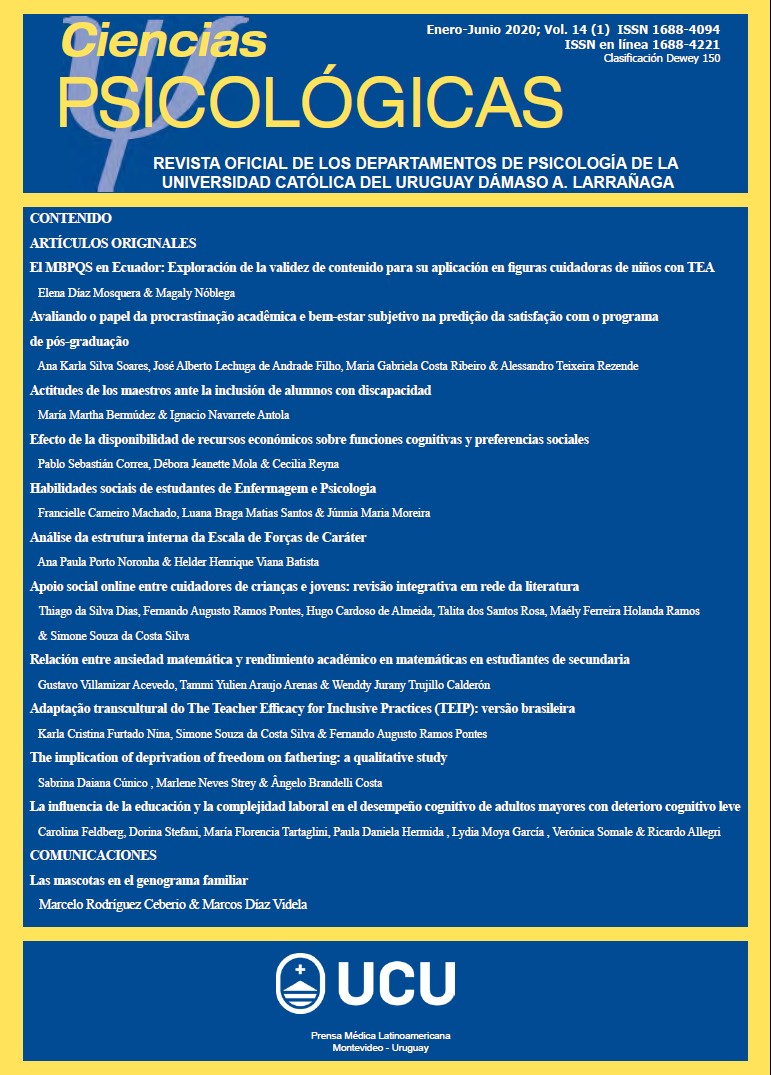La implicación de la privación de libertad en la paternidad: un estudio cualitativo
DOI:
https://doi.org/10.22235/cp.v14i1.2192Palabras clave:
Fathering, Gender, Prision, IncarcerationResumen
Este estudio tiene como objetivo analizar las prácticas de paternidad y los significados que le atribuyen los hombres encarcelados. Se realizaron entrevistas semiestructuradas con doce padres, encarcelados en una institución penal ubicada en el sur de Brasil. Los datos transcritos fueron analizados a través del Análisis Crítico del Discurso. Los resultados se presentan de acuerdo con dos temas: Privación de libertad X Privación de paternidad y Criminalidad X Paternidad. Nuestros hallazgos indican que los significados atribuidos a las prácticas paternales en el contexto de privación de libertad se basan en diversos factores psicosociales y el contexto carcelario en sí. Los resultados presentados aquí demuestran que la paternidad en la prisión es un fenómeno complejo y debe ser un foco de problematización académica. Su relevancia se da tanto en el contexto de los estudios de género como en los estudios que involucran a la familia y diferentes entornos.
Descargas
Citas
Arditti, J.A. (2012). Parental incarceration and the family: psychological and social effects of imprisonment on children, parents, and caregivers. New York and London: New York University Press.
Arditti, J. A., Smock, S. A., & Parkman, T. S. (2005). “It’s been hard to be a father”: a qualitative exploration of incarcerated fatherhood. Fathering, 3(3), 267-288.
Barcinski, M., & Cúnico, S. D. (2014). Os efeitos (in)visibilizadores do cárcere: as contradições do sistema prisional. Psicologia Portugal, 28(2), 63-70.
Bornholdt, E. A.; Wagner, A., & Staudt, A.C.P. (2007). A vivência da gravidez do primeiro filho à luz da perspectiva paterna. Psicologia Clínica, 19(1), 75-92. doi: http://dx.doi.org/10.1590/S0103-56652007000100006
Brasil. (1984). Lei de Execução Penal. Available at: http://www.planalto.gov.br/ccivil_03/leis/l7210.htm. Accessed in: 10 June 2014.
Brasil. (2014). Lei n° 12.962, de 08 de abril de 2014. Altera a Lei no 8.069, de 13 de julho de 1990 - Estatuto da Criança e do Adolescente, para assegurar a convivência da criança e do adolescente com os pais privados de liberdade. Available at: http://www.planalto.gov.br/ccivil_03/_Ato2011-2014/2014/Lei/L12962.htm. Accessed in: 25 June 2014.
Brasil. (2017). Levantamento Nacional de Informações Penitenciárias – Infopen. Departamento Penitenciário Nacional – Ministério da Justiça, 2017. Available at: http://www.justica.gov.br/news/ha-726-712-pessoas-presas-no-brasil/relatorio_2016_junho.pdf. Accessed in: December 8, 2017.
Brasil, M. V., & Costa, A. B. (2018). Psicanálise, feminismo e os caminhos para a maternidade: diálogos possíveis? Psicologia Clínica, 30(3), 427-446. doi: 10.590/1980-5438300320180427
Cisneros-Puebla, C. A., Faux, R., & Mey, G. (2004). Qualitative Researchers—Stories Told, Stories Shared: The Storied Nature of Qualitative Research. An Introduction to the Special Issue: FQS Interviews I. Forum Qualitative Sozialforschung / Forum: Qualitative Social Research, 5(3). doi: 10.17169/fqs-5.3.547.
Cúnico, S.D., Quaini, R.P., & Strey, M.N. (2017). Paternidades encarceradas: revisão sistemática sobre a paternidade no contexto do cárcere. Psicologia & Sociedade, 29, 1-11. doi: 10.1590/1807-0310/2017v29168770.
Fonseca, K.P. da (2006). Re(pensando) o crime como uma relação de antagonismo entre seus autores e a sociedade. Psicologia: ciência e profissão, 26(4), 532-547.doi: 10.1590/S1414-98932006000400002.
Foucault, M. (2004). Vigiar e Punir: Nascimento da prisão (20 Ed.) (R. Ramalhete, Trad.). Petrópolis, RJ: Vozes. (Original publicado em 1975).
França, L. A., Neto, A. S., & Artuso, A.R. (2016). As marcas do cárcere. Curitiba: iEa Sociedade.
Granja, Rafaela, Cunha, Manuela P. da, & Machado, Helena (2013). Formas alternativas do exercício da parentalidade: paternidade e maternidade em contexto prisional. Ex aequo, 28, 73-86.
Guimarães, C.F., Meneghel, S.N., & Oliveira, C.S. (2006). Subjetividade e estratégias de resistência na prisão. Psicologia Ciência e Profissão, 26(4), 632-645.
Hairston, C. F. (2003). Prisoners and their families: parenting issues during incarceration. In J. Travis., & M. Waul (Eds.). Prisoners once removed: the impact of incarceration and reentry on children, families and communities (pp. 259-282). Washington, DC: Urban Institute Press.
Jarvis, Joy, Graham, Sally, Hamilton, Penny, & Tyler, Dena (2004). The role of parenting classes for young fathers in prison: a case study. Probation Journal, 51(1), 21-33.
Lee, Ch-B., Sansone, F.A., Swanson, Ch., & Tatum, K.M. (2012). Incarcerated fathers and parenting: Importance of the relationship with their children. Social work in public health, 27, 165-186.
Machado, H., & Granja, R.P.G. (2013). Paternidades fragmentadas. Género, emoções e (des)conexões biogenéticas e prisionais. Análise Social, 48(3), 550-571.
Mapson, A. (2013). From Prison to Parenting. Journal of Human Behavior in the Social Environment, 23(2), 171-177.
Miranda, M.L.A., & Granato, T.M.M. (2016). Pais encarcerados: narrativas de presos sobre a experiência da paternidade na prisão. Psico, 47(4), 309-318.
Poupart, J. (2008). A entrevista do tipo qualitativo: considerações epistemológicas, teóricas e metodológicas. In Poupart, Jean, Deslauriers, Jean-Pierre, Groulx, Lionei-H, Lapierre, Anne, Mayer, Robert, & Pires, Álvaro. (Eds.). A pesquisa qualitativa: Enfoques epistemológicos e metodológicos. (A. C. Nasser, Trad.) (pp. 215-253). Petrópolis, RJ: Vozes.
Secret, M. (2012). Incarcerated fathers: exploring the dimensions and prevalence of parenting capacity of non-violent offenders. Fathering, 10(2), 159-177.
Silva, M.F., & Guzzo, R.S.L. (2007). Presidiários: percepções e sentimentos acerca de sua condição paterna. Revista Brasileira de Crescimento e Desenvolvimento Humano, 17(3), 48-59.
Superintendência dos Serviços Penitenciários. (2017). Relatório Estatístico. Available at: http://www.susepe.rs.gov.br. Acess in: 10 November 2017.
Tavares, G.M., & Menandro, P.R.M. (2004). Atestado de exclusão com firma reconhecida: o sofrimento do presidiário brasileiro. Psicologia: Ciência e Profissão, 24(2), 86-99.
Techera, J., Garibotto, G., & Urreta, A. (2012). Los “hijos de los presos”: vínculo afectivo entre padres privados de liberdad y sus hijos/as. Avances de un estudio exploratorio. Ciencias Psicológicas, 6(1), 57-74.
Ugelvik, T. (2014). Paternal pains of imprisonment: Incarcerated fathers, ethnic minority masculinity and resistance narratives. Punishment & Society, 16(2), 152-168.
Van Dijk, T.A. (2008). Discurso e poder. São Paulo: Contexto.
Waldegrave, K.E., & Woodall, J. (2016). A father in prison is still a father: paternal imprisionment and infant mental health. Journal of health visiting, 4(6), 1-4.
Descargas
Publicado
Cómo citar
Número
Sección
Licencia
Derechos de autor 2020 Universidad Católica del Uruguay

Esta obra está bajo una licencia internacional Creative Commons Atribución 4.0.
















